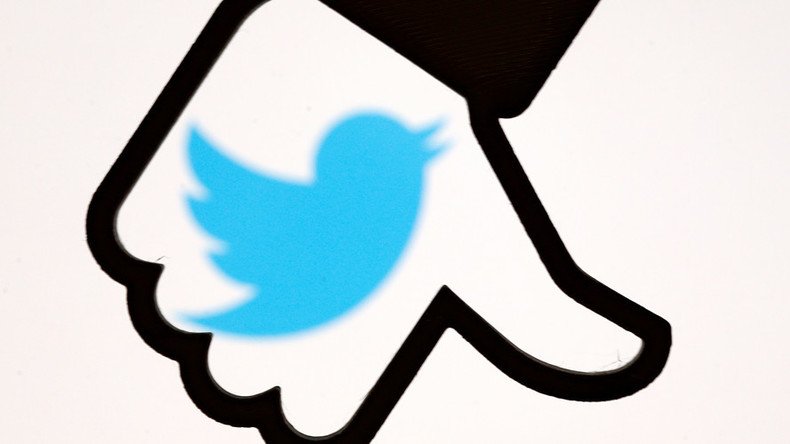‘Classic corporate cowardice’: Netizens furious over Twitter’s RT ad ban

Social media giant Twitter announced it was banning RT from placing any advertisements on the platform. Many netizens are calling it censorship and an attack on free speech.
Twitter says the reason for the ban is because RT “attempted to interfere with the election on behalf of the Russian government” – despite any evidence, apart from the good people at the CIA saying so, of course.
READ MORE: Twitter bans all RT advertising, citing ‘election interference’
A number of journalists have branded the company's decision as hypocritical, while The Intercept’s Glenn Greenwald described the decision as “classic corporate cowardice.”
There's no rhyme or reason to Twitter's decision. It's purely arbitrary: classic corporate cowardice to appease jingoistic pressure.
— Glenn Greenwald (@ggreenwald) October 26, 2017
Jack, can you provide some transparency and release the RT advertisements and those of VoA, BBC. al Jazeera,. BBG, NED, USAID, etc. so they can be compared?
— Julian Assange 🔹 (@JulianAssange) October 26, 2017
So irrational, cowardly & arbitrary. Are you keeping the millions in ads from the Saudi Government and other pro-US despots? https://t.co/L1emjXA6cg
— Glenn Greenwald (@ggreenwald) October 26, 2017
does twitter have a list of what govts are EVIL and which aren't because Saudi Arabia runs like 15 ad campaigns on here saying Iran did 9/11
— Adam H. Johnson (@adamjohnsonNYC) October 26, 2017
What if a foreign government complains that an American news outlet, say Fox News, is spreading American propaganda? What would Twitter do?
— Farhad Manjoo 🍭 (@fmanjoo) October 26, 2017
Warsaw Pact states used to try block the signal of Radio Free Europe, back in the day. Now the shoe appears to be on the other foot. https://t.co/BrI3ue02Zx
— Bryan MacDonald (@27khv) October 26, 2017
This is stupid and dangerous. Who will be next? https://t.co/0qVM5iJIkF
— Ali Abunimah (@AliAbunimah) October 26, 2017
If "Russian interference" achieved 1 thing—it exposed US hypocrisy on liberal principles we push on world. Huge win https://t.co/0nIry14Zhl
— Mark Ames (@MarkAmesExiled) October 26, 2017
Many netizens have been left understandably upset by the move, calling the action an attack on free speech and press freedom.
Attacking free speech, expression and opinion wasn't enough... now you target the press.
— 🌺/K/aitilyn🇺🇸 (@kitty_Kaiti) October 26, 2017
Am disgusted by this @Twitter.
— Tanweer Dar (@tanweer_dar) October 26, 2017
This is an international site, i'm not from the USA but i'm still affected by your internal problems. This is against press freedom.
— ⭐️--__--💧 (@DilemaGoldman) October 26, 2017
READ MORE: Revealed: How Twitter pushed RT to spend big on 2016 US election
Others asked if Twitter had any plans to ban other media outlets from advertising on the platform, while also slamming the company for bowing to political pressure in the US.
Will Twitter target British propaganda BBC, USA propaganda CNN in same way ..or is this selective to only one country?
— Sukhoi (@Sukhoi004) October 26, 2017
What about fox news? You forgot one right...or just left huh?
— Skip (@i_b_landers) October 26, 2017
@Twitter bowing down to US establishment orders. Bad day for democracy!
— Alvaro Headrata (@TheChelseaSpark) October 26, 2017
I never thought Twitter would bend the knee to the massively corrupt US intelligence services. I stand with @RT_com@RTUKnews on this.
— Look Aboot Ye (@ThereWasACoo) October 26, 2017
LMAO What a great example of freedom of speech!!! Democracy is shining!!!
— Serguei Makarov (@SergueiMakarov) October 26, 2017
Ironically enough, prior to announcing the ban, Twitter wrote a letter to RT in which it outlined its reasoning. “At Twitter we believe in freedom of expression and in speaking truth to power. We also want to ensure that people feel safe when they interact with our site, and that advertisers bring value to our users.”
Next week, Twitter management is due to testify to a US House committee over its role in supposed election meddling last year, alongside Facebook and Google.













